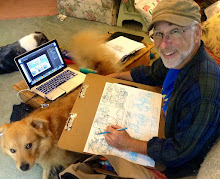OK--if this in-progress photo of Jim Rugg's knock-out double-page centerfold spread for the upcoming pood no.4
doesn't knock your socks off then call a doctor! Get somebody to check
your pulse--because, brother you must be gone, GONE from this world! I
say-Cold! cold as a stone!
Pood no.4 in July Previews! JUL110903 F POOD #4(MR).) Featuring Jim Rugg's 2-page centerfold MASTERPIECE--"RAMPAGE"! CALL YOUR RETAILER! ORDER TODAY--before they're all gone!
Tuesday, July 26, 2011
Thursday, July 21, 2011
Goodbye Xeric
By now it's common knowledge that the Xeric grants for self-publishing comics will be ended soon.( here's the press release).
As a former recipient, I thank the Xeric foundation, its board members, and especially Peter Laird, for their support of my work and the opportunities afforded me as a result. The Xeric grant has been one of the seminal moments in my endeavors in comics, and one of my most gratifying experiences as an artist.
The support the foundation has offered to comics creators is singular, unique--and since its inception it has certainly had an incalculable effect on the medium. The list of Xeric winners is a compendium of some of the best cartoonists working today, and its influence is clear at SPX, MoCCA and anywhere there are comics. It would be a very different comics environment without the Xeric. The gifts the Xeric brought to comics are an achievement to be celebrated--and maybe at SPX or somewhere, someone should throw a party to do just that.
For better or worse though, I think the arguments for the ending of the Xerics miss one of the salient points of the grant in the first place-i.e. that of getting comics into print. Print, with all of its qualities, capabilities, and restrictions. Print as medium, material, and object.
That the web can serve the same objective as the Xeric--i.e. the dissemination of a creator's work to the public--is certainly true as far as it goes. But it fails to consider that the grants afforded the thinking artist the opportunity to explore the aesthetics of print, and the nature of the object and the medium, i.e. the comic book. The web offers a platform for creators, no doubt. But creatively speaking, it's a different medium than the comic book(cartooning and comic books are not necessarily synonymous; i.e., comic books need not be cartoons)--and while much of traditional cartooning, i.e. contour line drawing augmented by color or gray tonalities, is well-served on the computer screen--there are ideas and approaches to the medium that are not--such as my own "Look Out!Monsters" or "fandancer"( which I'm assuming, if you're reading this you've read or seen--if not shame on you! Buy them now!)
There isn't a publisher active today who would touch "Look Out!Monsters" (or for that matter, "fandancer") with a ten-foot pole. There are many reasons for that--not necessarily having to do with issues of quality(!)-but having to do with cost, audience and "standards of taste" that define conventional views of the medium. The opportunity to experiment with the comic book as a form; its size and shape, the paper; the exploration of interplay between pages; the choices of imagery and the interaction between source image and printing process--those experiments are not something a publisher is likely to try out with an unknown artist. It simply costs too much. But grants like the Xeric are immune to the demands of the marketplace and allow for the "noble experiment". They allow for failure. (don't confuse "Kickstarter" with a grant program. Its successes will more or less be dependent upon the availability of an existing audience, whereas innovation/experimentation is not necessarily going to have such an audience. ).
The Xerics did more than simply provide funds for printing. They also offered support without asking for anything in return. When I ran into some legal difficulties with "Look Out!Monsters", the Xeric foundation was there with advice and moral support that helped me through a difficult period.
The web certainly offers the imaginative creator a wide array of choices and possibilities--this is not to argue against webcomics-as they are or as they will become. Not at all. This is simply to say the Xeric afforded a certain kind of opportunity that was distinct, the opportunity to explore form--a singular form--the comic book--one that is unique in our history and experience.
That the Xerics are now a part of history is another indication that the form is on the precipice of fundamental change.
But--- I can't end this on that note. No,no, no!--because the Xeric foundation grant was such an unequivocally positive force in my life--and a positive force for change in this world we call comics, I lift my cup of morning tea, and doff my baseball cap to say " Thank You! Thanks, Mr. Laird! Thanks, Xeric board members! Thanks to everyone at the Xeric foundation! Thanks for all those great comics! You will be missed--but you've left us all so much better off than we were!"
Goddbye, Xeric!
Subscribe to:
Comments (Atom)



